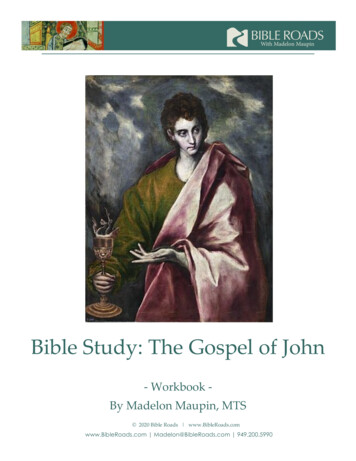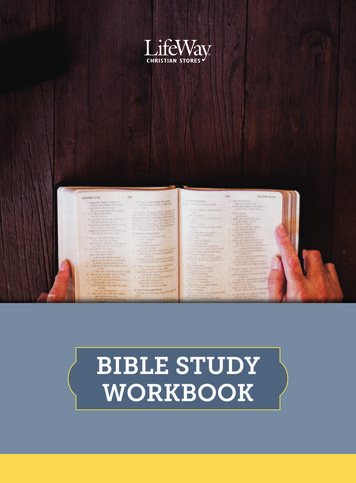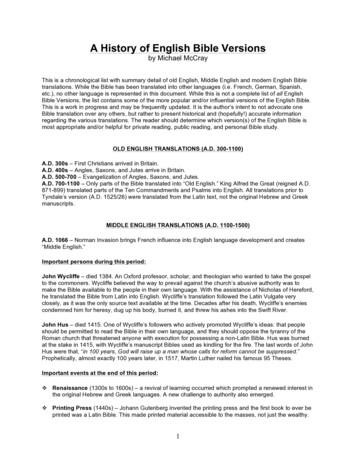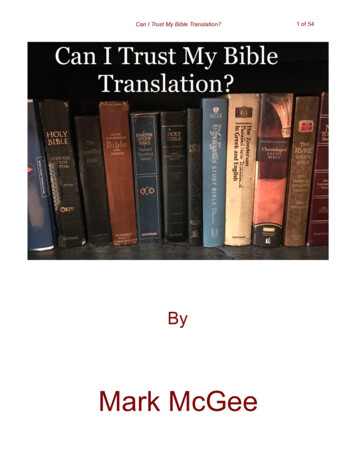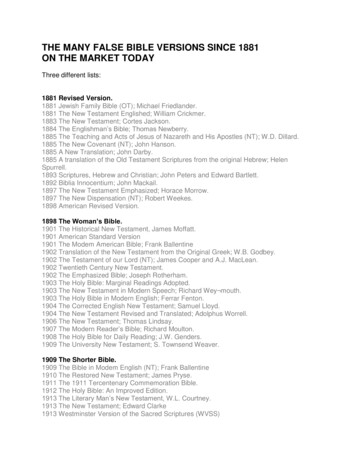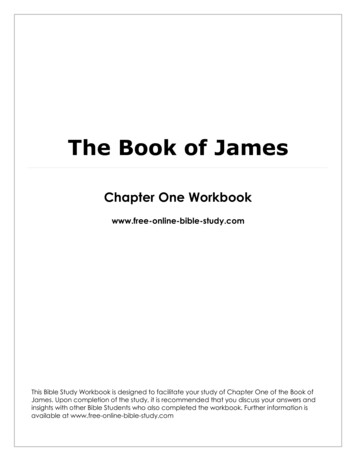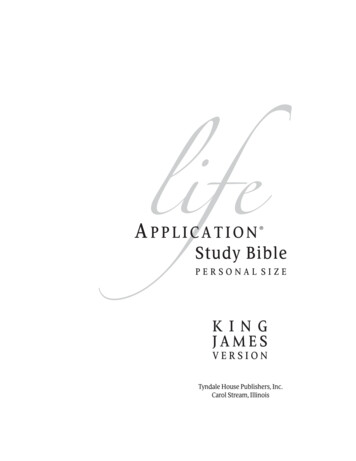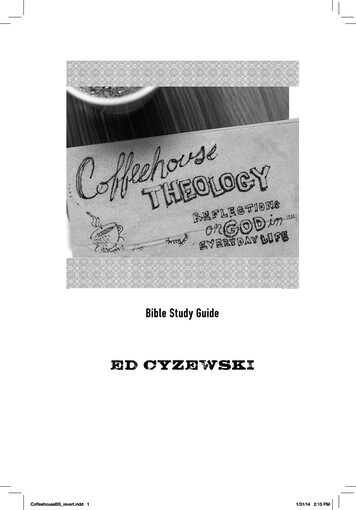
Transcription
Bible Study GuideEd CyzewskiCoffeehouseBS revert.indd 11/31/14 2:15 PM
CoffeehouseBS revert.indd 21/31/14 2:15 PM
To my grandparents John and Phyllis QuinnCoffeehouseBS revert.indd 31/31/14 2:15 PM
CoffeehouseBS revert.indd 41/31/14 2:15 PM
ContentsFirst Thoughts7Acknowledgments11Getting Started: The Supremacy of Love131. Theology from the Inside Out212. How to Do Christian Theology293. Christianity Is Embedded in Culture . . . Now What?374. From Modern to Postmodern475. Christianity in a Changing World556. The First and Only Foundation637. The Bible: Our Salvation Story718. Learning from Our Traditions819. The Diversity of the Church8710. The Joining of Spirit and Truth95Notes103About the Author107CoffeehouseBS revert.indd 51/31/14 2:15 PM
CoffeehouseBS revert.indd 61/31/14 2:15 PM
First ThoughtsWith Coffeehouse Theology, I provided an introduction to contextual theology. If you haven’t read the book yet, you might wonder, Just what iscontextual theology? Briefly, it’s the challenge of learning about God with anawareness of context, while at the same time valuing different insights fromother cultures where Christians are learning about God in their own particular situations. We form contextual theology by understanding our owncontext and traditions and by including perspectives outside of our own, allin the midst of our study of the Bible.While you can find a number of great books written on a scholarly levelby leading contextual theologians, the goal of Coffeehouse Theology is toprovide a bridge to connect their work with today’s church.However, because I often reduced and simplified complex issues andrarely had opportunity to dig into a thorough study of Scripture verses inthe main book, I also want to help you explore several key Scripture passagesthat show how you can actively participate in a contextual theology thatleads to kingdom action. The goal of this Bible study guide is to help you(and others you meet within a small group or Sunday school class setting)take these first steps.7CoffeehouseBS revert.indd 71/31/14 2:15 PM
C o ff e e h o u s e t h e o l o g y b i b l e st u d y g u i d eHow to Use this GuideThis Bible study workbook is actually one of two study guides that can helpyou apply what you’ve learned from Coffeehouse Theology. The other studyguide, Coffeehouse Theology: Contemporary Issues Discussion Guide, will helpyou put the thoughts of global and historic theologians regarding a variety ofpressing issues to best use in theology today. The study guide you’re holdingbegins with biblical passages and then works through a series of discussionquestions and commentaries. After reading a chapter of Coffeehouse Theology(or in the case of session 4, two chapters), you can find the correspondingsession in this guide and dig deeper while also learning how to put a soundmethod of contextual theology into practice. In each session, you’ll walk through some relevant contextual issues,meditate on a pertinent passage from the Bible,consider a few words of my commentary to jumpstart your thinking,ponder brief but valuable insights from historic or global Christians,discuss some ways to apply the issue to the mission of God’skingdom, begin exploring ways to live out your theology in your daily life.Through Coffeehouse Theology and this Bible study guide, you’ll quicklycatch on to simple ways to form and to live out theology today. Allow me toshare a few thoughts that will help you and your group get the most out ofeach session: Study the entire chapter from which the selected verses in the sessionare taken. In fact, I suggest that you read the chapters preceding andfollowing the quoted chapter. Better yet, pick up The Message or theNew Living Translation and read the entire book of Scripture to gainan idea of where the passage you’re studying fits in with the author’smain ideas. Don’t try to answer every single question. We all learn in differentways. The same holds true when it comes to how we approach8CoffeehouseBS revert.indd 81/31/14 2:15 PM
F i r st T h o u g h tstheology. You and the other people in your discussion group mightcome at theology from a variety of angles, so I’ve done my best toprovide a wide range of questions. But don’t worry; I won’t be handing out grades after you complete this study! Tackle the hard questions. When a question seems especially unsettling, that’s one you should try to answer, even if it means takingsome extra time to work through it. Remind yourself that your faith rests on the revelation of JesusChrist, the Son of God. That will allow you to hold up assumptions, personally important issues, and particular doctrines to greaterdegrees of scrutiny. You might find that God is quite different fromyour personal sketches of him — I know that I’ve discovered somefresh and revealing insights about God through studies like this one. Pay special attention to the “Living Out Your Theology” section atthe end of each session. This section will help you get theology out ofyour head and into your heart and hands and feet. This section willhelp you become aware of the best ways to share the gospel and ofthe greatest needs your ministries can meet.Why Jump In?Again, this study guide aims to help you learn how to put contextual theology into practice. Each session will help you reflect on the main pointsof Coffeehouse Theology while also working through some of theology’scontextual, biblical, historic, and global aspects. Please keep in mind thatunderstanding and even forming theology isn’t limited to “professional”theologians. In fact, a growing conversation is taking place in the local,global, and historic church, led by the Spirit of God as his people studyhis inspired Scripture, seek to know him, and join him in the work ofhis kingdom.Ed Cyzewski9CoffeehouseBS revert.indd 91/31/14 2:15 PM
CoffeehouseBS revert.indd 101/31/14 2:15 PM
AcknowledgmentsI’m deeply grateful to Caleb Seeling of NavPress for taking the time to discussthe idea of this study guide with me and for helping me put together somepractical ideas on how to provide a simple step from the ideas of CoffeehouseTheology into everyday, practical theology. My editor, Brad Lewis, did muchto sharpen my ideas and bridge the study guide with the main book. I’mgreatly indebted to his masterful synthesis of ideas. My wife, Julie, providedtimely and indispensable support in both researching and reading throughthe manuscript, and I do not exaggerate when I say this guide is much betterthan I could have imagined thanks to her hard work and insights.11CoffeehouseBS revert.indd 111/31/14 2:15 PM
CoffeehouseBS revert.indd 121/31/14 2:15 PM
Getting StartedThe Supremacy of LoveTo get the most out of this session,I suggest reading the introduction in Coffeehouse Theology.Iwant to start at the end.At the end of the introduction to Coffeehouse Theology, I point out thattheology’s far-reaching influence into our everyday lives calls us into a carefulconsideration of just where our beliefs come from. And in the final chapter ofthe book, I point out that love — loving God and loving one another — standsas the ultimate goal of theology.I’d like to ground all of theology in this very Christian practice of lovingGod and loving one another. Good theology should point to love as thehighest goal. Theology that doesn’t result in greater love becomes a futileexercise in accumulating knowledge. If theology is truly about learning tolove God in deeper ways, then love should be at the forefront of our mindsduring our first steps in theological study. As a result, when we live out ourtheology in practical ways, we should see arguments, division, and bitternessdecrease while love, dialogue, unity, and diversity increase. Unless we measuresuccess by this second list, theology will never help the church embody God’skingdom here on earth.13CoffeehouseBS revert.indd 131/31/14 2:15 PM
C o ff e e h o u s e t h e o l o g y b i b l e st u d y g u i d eContex t: Love and Unit y in Today’s WorldThe willingness to look at both culture and context as we form and then liveout our theology plays a central role in Coffeehouse Theology. Context simplymeans your situation — the “where you are” that’s a part of making you “whoyou are.” While context is somewhat individual, culture might be describedas “the way of life for an entire society,” including “codes of manners, dress,language, religion, rituals, norms of behavior, . . . and systems of belief.”1And of course, we also look to the Bible as a primary source as we formour theology.In chapters 4 and 5 of Coffeehouse Theology, I address the culture’s shiftfrom a modern context to a postmodern one. Surprisingly, these philosophical concepts can teach us a lot about Christian unity and love. Speaking inbroad terms, certainty was the goal in the modern context, while today’spostmodern culture has room for ambiguity and dialogue. The danger in themodern context was disagreement and division, while the pitfall in the postmodern world is a noncommittal relativism that refuses to take a position onimportant topics.I bring up these weighty philosophical movements because, whetherwe like it or not, they radically shape how we think and interact with oneanother. If the goal is absolute certainty when it comes to theology, then we’llfind it much more difficult to love and accept people who hold perspectivesthat differ from ours. However, if the goal is dialogue and working towardthe truth with room for a variety of views, we have a framework that createsspace for love in the midst of disagreements.With this context in mind, ponder and discuss the following questions: When dealing with theology, are you more comfortable withcertainty or uncertainty? When might uncertainty be appropriate fortheologians?14CoffeehouseBS revert.indd 141/31/14 2:15 PM
G e tt i n g S ta r t e d Why do you think Christians argue about theology? As budding theologians, how should we balance love and unity withtheological disagreements?MeditationTake some time to meditate on 1 Corinthians 13:8-13 and then discuss thequestions that follow:Love never fails. But where there are prophecies, they will cease;where there are tongues, they will be stilled; where there is knowledge, it will pass away. For we know in part and we prophesy inpart, but when perfection comes, the imperfect disappears. When Iwas a child, I talked like a child, I thought like a child, I reasonedlike a child. When I became a man, I put childish ways behind me.Now we see but a poor reflection as in a mirror; then we shall seeface to face. Now I know in part; then I shall know fully, even as Iam fully known.And now these three remain: faith, hope and love. But thegreatest of these is love. How would you define the words faith, hope, and love in this passage?Which do most churches today seem to show? Why?15CoffeehouseBS revert.indd 151/31/14 2:15 PM
C o ff e e h o u s e t h e o l o g y b i b l e st u d y g u i d e Why do you think the apostle Paul said “the greatest of these is love”? Think about what’s most important to you and to your Christiancommunity. How would placing love above everything else changeyour community?My ThoughtsToday’s church romanticizes the early church as happily meeting in homesin a state of unity under the godly teachings of Paul, the super-apostle. Infact, in some Christian quarters today, churches have a fascination with goingback to the ways of the early church. However, the truth is that the earlychurch was full of quarrels, debates, divisions, and groups that refused toget along. In addition to theological disputes, early Christians also struggledwith a racial tension among Jews and Gentiles who were suddenly expectedto worship the same God after hundreds of bitter years of avoiding eachother. In fact, the early church could have split in innumerable ways.Now that we’ve got the background straight, let’s talk about meat. I grewup in a home where meat was the main ingredient of just about every meal.Americans (by which I mean citizens of the United States of America) lovecheap meat, and producers have developed an entire system to provide thecheapest meat possible to consumers. No matter how this system affects thestreams and fields — not to mention the hormones and slop stuck into theanimals crammed into buildings where they stand in their own filth — themodern meat industry delivers the cheap meat that Americans crave fortheir meals. Even if locally purchased, grass-fed animals provide healthiermeat and probably keep the environment in better shape, price becomes the16CoffeehouseBS revert.indd 161/31/14 2:15 PM
G e tt i n g S ta r t e dultimate determiner for many people who can’t afford pricey organicproducts.If Americans are willing to purchase meat injected with antibiotics andraised in questionable conditions, then we should be able to relate to theproblems Paul had with meat during the days of the early church. Insteadof dealing with chemicals or conditions on a feedlot, Paul struggled to finda godly path through the issue of meat sacrificed to idols. With so muchmeat left over from the sacrifices to false gods who didn’t have much use foranimal flesh, the Greeks established a system of selling the sacrificed meat ata reduced rate. This was almost like joining together the temple of the localgods and a Sam’s Club. Savvy Christian shoppers could eat well while savingquite a bit of money.However, this method of shopping didn’t sit well with some recentconverts to Christianity from pagan religions, who struggled to separatethe meat from the worship of idols. Imagine the confusion that arose whenChristians gathered for the Lord’s Supper (or Communion, which was a mealback then) and placed in front of them was meat that had been sacrificedto idols! In the midst of a Christian act of worship, they faced the idolatrythey’d left. Meanwhile, other Christians had no trouble eating this meatbecause they were confident these fictitious gods posed no threat to theirfaith in God.Enter Paul.Think of the kid you knew who always found his way into trouble, spenta lot of time in the principal’s office, and yet possessed irresistible charmand moments of brilliance, and you’ll have a rough sketch of the Corinthianchurch and its relationship with Paul, the parent with graying hair. Godhad granted the Corinthian Christians incredible gifts of healing, prophecy,and teaching. But they abused these gifts, struggled to maintain unity, andeven looked down on Paul, whom they considered unimpressive and timid.The apostle, however, exerted much time and energy to bring this waywardchurch back in line with the love of Christ and the gospel. When those troubled by the meat sacrificed to idols spoke up, they were largely ignored bythose who claimed to possess superior knowledge.In 1 Corinthians 10:24, Paul attacks this rampant individualism and17CoffeehouseBS revert.indd 171/31/14 2:15 PM
C o ff e e h o u s e t h e o l o g y b i b l e st u d y g u i d etheological snobbery with this simple principle: “Nobody should seek his owngood, but the good of others.” While avoiding a black-and-white condemnation of one group or the other, Paul points this church to love, proclaimingthat love should guide every aspect of their lives and worship. Because Godcalled Christians to glorify him in all they do, Paul reminds the Corinthianbrothers and sisters to avoid offending each other by following the exampleof Christ (see 1 Corinthians 10:31-33).I find it amazing that through the centuries since Paul wrote these wordsabout Christian unity, some Christians have used 1 Corinthians 13 to fosterother divisions in the church. Some factions use this chapter to argue againstthe continuation of prophecy, healing, and tongues after the apostolic period.Others take Paul’s statement about knowledge fading away and all of our pithylittle beliefs amounting to little more than the reflection of a dim mirror asproof that serious Christian scholarship is of little value. So I have to ask, arewe really catching on to this passage and Paul’s focus on Christian unity?Sometimes I can’t help wondering if we’re hopeless. Far from laying outwhat was in or out for the church, Paul cut through all of the petty squabblesand established love as the supreme way for the church to thrive. If we reallydig into the story behind this epistle, we see a church not so different from ourown today, and we’ll find Paul’s words oddly . . . relevant, as he commandsthe church to follow the way of love (see 1 Corinthians 14:1).Fortunately Paul doesn’t stop with correcting the Corinthian Christiansfor failing to remain unified. He shows them the most excellent path tofollow no matter what the situation: love. It might have been much easierif the apostle simply provided a list of what’s approved and what’s taboo.But instead Paul points this troubled church to love — and God desires thatChristians today follow that same path toward unity.Insights from the Historic/Global ChurchThe great church father Augustine made a radical statement that chafesagainst the desire of some Christians to be right instead of being unitedor loving: “When interpreted correctly, all Scripture leads to love of Godand one’s neighbor.”2 I find that many American Christians make it their18CoffeehouseBS revert.indd 181/31/14 2:15 PM
G e tt i n g S ta r t e dbusiness to protect Christianity, to guard the Bible, and to fight a battleagainst secular culture in order to preserve a Christianized version of oursociety. This combative outlook runs counter to the biblical witness, pittingGod’s chosen people against the people we’re supposed to serve as ambassadorsof God’s kingdom. While we should always speak the truth as Christians, anunnecessary level of antagonism arises when we speak of defending the Bibleor the truth. Instead of focusing solely on arriving at the correct doctrine,Augustine set his sights on reflecting the character of the God he studied.In his book The Heavenly Man (London: Monarch, 2002), Chinese housechurch leader Brother Yun shares how the Chinese church struggled througha difficult period of division. When Western Christians began smugglingBibles into China, they added the bonus of books about doctrine. Over thecourse of time, the Chinese church split along the lines specified in thesetheology books to the point that certain church leaders would hardly stayin the same room together. Brother Yun worked tirelessly to bridge thesplits destroying the Chinese church and eventually succeeded. He not onlymanaged to bring various leaders together, but one prominent pastor humblywashed the feet of a rival. This landmark moment marked the beginning ofa sorely needed period of reconciliation in the church. In the end, the love ofGod conquered the supposedly superior knowledge of differing denominations, as they united in their love for and fellowship with Christ.Applying to Mission If good theology “leads to love of God and one’s neighbor,” asAugustine stated, what needs to change when we form theology? Do you have any contact with someone who holds a low opinion ofChristians? If appropriate, ask this person to express his or her opinion about Jesus and Christians. Don’t argue — your objective is tolisten and learn.19CoffeehouseBS revert.indd 191/31/14 2:15 PM
C o ff e e h o u s e t h e o l o g y b i b l e st u d y g u i d e What group in your area needs to experience the love of God? Thismight be a socioeconomic group or some other demographic categoryof individuals. List one or two of these groups and then brainstormways you can demonstrate the love of God to them. (Hint: Thinkbeyond a simple gospel presentation.)Living Out Your Theology Have you been burned by a Christian who failed to love, or have youfailed to love a fellow Christian? What was the central issue of yourargument or division? How can you increase your dialogue with Christians from otherbackgrounds? What five theological issues are most important to you? How can youhold on to these doctrines while also preserving unity and love withChristians who disagree with you?20CoffeehouseBS revert.indd 201/31/14 2:15 PM
Theology from the Inside OutTo get the most out of this session,I suggest reading chapter 1 in Coffeehouse Theology.At rock bottom, Christianity is a story about God reconciling himself withthe disobedient children of the human race. The love and mercy of Godtake center stage as he invites humanity to enter his kingdom, where hishealing and justice reign. Jesus proclaimed that God’s kingdom is very muchpresent in this world; when Jesus returned to heaven, he left his followersthe task of living under and declaring God’s present and imminent rule andinviting one and all to enter. For Christians carrying out this mission today,theology becomes their vital tool. The kingdom of God isn’t just the contentof Christian theology. It’s the driving force.Contex t: Americans and the Kingdom of GodAs Americans who live in a democratic society, we can easily misunderstandthe nature of God’s kingdom and his rule. We’re used to having a say in ourgovernment, so handing over control to an all-powerful ruler seems terrifying, no matter how benevolent he may seem.While we struggle to re-create the mood of the prophecies concerning21CoffeehouseBS revert.indd 211/31/14 2:15 PM
C o ff e e h o u s e t h e o l o g y b i b l e st u d y g u i d ethe coming of God’s rule, for the most part the focus of God’s kingdom isa reunion with his beloved people and the establishment of true justice andpeace. Far from establishing a cruel dictatorship, God delights in his peopleand wants to bring healing to the nations. Of course, this can only happenif we drop our own agendas — which typically put us first — and submit tohis rule.While most people readily agree that all is not as it should be in thisworld, the tough part is getting the same people to admit that God’s plan isthe one to follow. Americans especially seem convinced of their own goodnessand excellent intentions. To make matters worse, many American Christiansally themselves tightly with political parties, committing resources to flawed,man-made methods of bringing God’s kingdom to earth.What’s more, if this overall allegiance to man-made institutions isn’t badenough, many American Christians create their own little kingdoms withintheir denominations or local churches. Theology often gets caught up in thetangled mess of these hefty organizations that eat up time and resources.Instead of helping Christians spread the gospel and live in the reality of God’skingdom among people who need both so badly, theology serves the agendaof these smaller kingdoms, providing the ammunition for internal disputesand unending debates. Most of us find it much too tempting to cling toour own plans. But as a result, we restrict theology to our internal concernsinstead of using theology to draw near to God, to live in the reality of hisrule, and to spread the message of the kingdom.With this context in mind, ponder and discuss the following questions: Use a Bible concordance and look up three passages in the gospelswhere Jesus talks about the kingdom of God or the kingdom ofheaven. How is the kingdom different from the church?22CoffeehouseBS revert.indd 221/31/14 2:15 PM
Theology from the Inside Out List three theological doctrines that you believe have a powerfulinfluence on your faith. How do they affect the way you share thegospel? Tell your “salvation story” in a few paragraphs. How has theologychanged your understanding of God since you first began your relationship with Christ?MeditationTake some time to meditate on Isaiah 42:1-7 and Luke 4:18-19 and thendiscuss the questions that follow:“Here is my servant, whom I uphold,my chosen one in whom I delight;I will put my Spirit on himand he will bring justice to the nations.He will not shout or cry outor raise his voice in the streets.A bruised reed he will not break,and a smoldering wick he will not snuff out.In faithfulness he will bring forth justice;he will not falter or be discouragedtill he establishes justice on earth.In his law the islands will put their hope.”23CoffeehouseBS revert.indd 231/31/14 2:15 PM
C o ff e e h o u s e t h e o l o g y b i b l e st u d y g u i d eThis is what God the Lord says —he who created the heavens and stretched them out,who spread out the earth, and all that comes out of it,who gives breath to its people,and life to those who walk on it:“I, the Lord, have called you in righteousness;I will take hold of your hand.I will keep you and will make youto be a covenant for the peopleand a light for the Gentiles,to open eyes that are blind,to free captives from prisonand to release from the dungeon those who sit in darkness.”(Isaiah 42:1-7)“The Spirit of the Lord is on me,because he has anointed meto preach good news to the poor.He has sent me to proclaim freedom for the prisonersand recovery of sight for the blind,to release the oppressed,to proclaim the year of the Lord’s favor.” (Luke 4:18-19) Did Jesus bring justice as these passages suggest? How?24CoffeehouseBS revert.indd 241/31/14 2:15 PM
Theology from the Inside Out How do you think the original readers interpreted these passagescompared to how we read them today? Do you think Christianstoday overly spiritualize these verses? How? What role do the people of God play in these passages?My ThoughtsEaster is one of my favorite Christian feasts because I love the story of Jesus’resurrection. Celebrating the Resurrection is as good as it gets for Christians,because the event heralds the new life and freedom won by Christ. The onlydamper on this celebration of new life and salvation, in my opinion, is thechurch.In many churches, Easter Sunday ends up being an awkward time. Theirregular attendees known as “Easter People” show up in their best Sundayclothes, while the regulars sit smugly and wait for the preacher to roast thesepeople who like God a lot but only as friends. Easter morning often becomesthe primary ambush time to drop the full weight of the gospel message on theEaster People who clog up the parking lot and drink all the coffee. I remember spending many Easters glaring at the new faces in the crowd and thinking, You’re really in for it now. The Easter People quickly realize they mustpass through the sermon gamut: God loves you and has a wonderful plan foryou that includes attending this church and saying this prayer to be saved.The worst Easter morning I ever experienced involved a long, elaborate,and technical explanation of just how salvation works. The preacher hauledout words such as atonement and propitiation, spending enormous amountsof time defining them, setting them up, and then reconnecting them with his25CoffeehouseBS revert.indd 251/31/14 2:15 PM
C o ff e e h o u s e t h e o l o g y b i b l e st u d y g u i d emain point, which ambled toward saying a prayer at the end of the service. Asa theology student, I could follow his lengthy treatise. But even I was boredand uninspired, so I wondered how our church’s guests felt that day.Sadly, we’ve somehow managed to lose the incredible story of God’srescuing humanity from death by conquering it from the inside, substituting abstract doctrines and a mechanical, step-by-step salvation process. Wefocus so closely on a few crucial details that we lose the grand narrative andimmense scope of salvation.In Luke 4:14-30, Jesus isn’t preaching on an Easter morning. But he doesmake a strong connection to the prophecy in Isaiah 42 about his mission tobring righteousness and justice to Israel and ultimately to the entire world.Christians who spend their Easter mornings listening to sermons about receiving the death of Jesus in order to go to heaven — and I include myself withthis group — aren’t quite sure what to do with Jesus’ message about proclaiming freedom for prisoners, recovering the sight for the blind, or releasing theoppressed.The gospel of John reminds us that Jesus’ ministry combined physical signs that pointed to deeper spiritual truths. The spiritually blind andoppressed people of Israel needed spiritual vision, but Jesus also healed peoplewho were blind physically. Both the physical and spiritual pointed to thearrival of God’s kingdom and a new way of interpreting their role as God’schosen people through the ministry, death, and resurrection of Jesus.1 Whilethose who follow Jesus indeed enjoy eternal benefits, the passage from Isaiahsuggests something significant is also taking place in our world right now.The rule of God has dawned.Far from simply establishing a message about spiritual change throughaccepting a new doctrine or praying a prayer, Jesus’ mission reached morebroadly and deeply into the lives of his listeners. He also called for a newworld with greater freedom and justice resulting from the spiritual changebrought about when people learn to love God and one another. Jesus not onlyredefined the terms of knowing God — as a Father or parent — he broughtthe beginning of God’s rule on earth.26CoffeehouseBS revert.indd 261/31/14 2:15 PM
Theology from the Inside OutInsights from the Historic/Global ChurchIn the Philippines, farmers have suffered the loss of their lands and watched afew wealthy individuals accumulate wealth at the expense of the many poor.After selling off their lands to large farming conglomerations, many of thesefarmers go hungry while feeding the rest of the world. In this context, themessage of Luke 4:19 jumps off the page to offer hope in ways few Americanswould ever consider.Theologian Helen R. Graham points to the implications of Jesus’ messagein Luke 4:19 concerning the year of the Lord’s favor or the year of Jubilee.Jesus refers to Leviticus 25:8-54, where God commands Israel not only totake a year off from planting, but also to return all land to the originalowners.2 Because of this command, no one could accumulat
1. Theology from the Inside Out 21 2. How to Do Christian Theology 29 3. Christianity Is Embedded in Culture . . . Now What? 37 4. From Modern to Postmodern 47 5. Christianity in a Changing World 55 6. The First and Only Foundation 63 7. The Bible: Our Salvation Story 71 8. Learning fro


